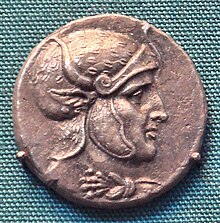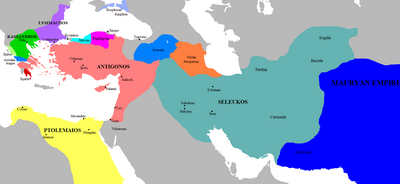The Seleucid Empire (/sɪˈl(j)uːsɪd/),[4] also known as Seleucia (Ancient Greek: Σελεύκεια, Seleúkeia) or Syria,[5] was a Hellenisticstate ruled by the Seleucid dynasty founded by Seleucus I Nicator following the division of the empire created by Alexander the Great.[6][7][8][9] Seleucus received Babylonia and, from there, expanded his dominions to include much of Alexander's near easternterritories. At the height of its power, it included central Anatolia, Persia, the Levant, Mesopotamia, Kuwait, what is now Pakistan,Afghanistan, Turkmenistan, and northwest parts of India.
The Seleucid Empire was a major center of Hellenistic culture that maintained the preeminence of Greek customs where a Greek-Macedonian political elite dominated, mostly in the urban areas.[9][10][11][12] The Greek population of the cities who formed the dominant elite were reinforced by emigration from Greece.[9][10] Seleucid expansion into Anatolia and Greece was abruptly halted after decisive defeats at the hands of the Roman army. Their attempts to defeat their old enemy Ptolemaic Egypt were frustrated by Roman demands. Much of the eastern part of the empire was conquered by the Parthians under Mithridates I of Parthia in the mid-2nd century BC, yet the Seleucid kings continued to rule a rump state from Syria until the invasion by Armenian king Tigranes the Great and their ultimate overthrow by the Roman general Pompey.
Alexander conquered the Persian Empire under its last Achaemenid dynast, Darius III, within a short time frame and died young, leaving an expansive empire of partly Hellenised culture without an adult heir. The empire was put under the authority of a regent in the person of Perdiccas in 323 BC, and the territories were divided between Alexander's generals, who thereby became satraps, at the Partition of Babylon in 323 BC.
Rise of Seleucus
Alexander's generals (the Diadochi) jostled for supremacy over parts of his empire. Ptolemy, a former general and the satrap ofEgypt, was the first to challenge the new system; this led to the demise of Perdiccas. Ptolemy's revolt led to a new subdivision of the empire with the Partition of Triparadisus in 320 BC. Seleucus, who had been "Commander-in-Chief of the camp" under Perdiccas since 323 BC but helped to assassinate him later, received Babylonia and, from that point, continued to expand his dominions ruthlessly. Seleucus established himself in Babylon in 312 BC, the year used as the foundation date of the Seleucid Empire. He ruled not only Babylonia, but the entire enormous eastern part of Alexander's empire:
Seleucus went as far as India, where, after two years of war, he reached an agreement withChandragupta Maurya, in which he exchanged his eastern territories for a considerable force of 500 war elephants, which would play a decisive role at Ipsus (301 BC).


No comments:
Post a Comment